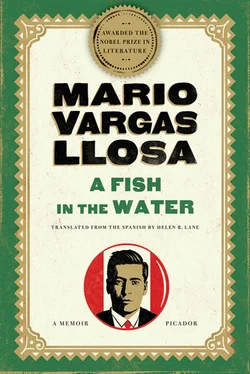Mario Vargas Llosa - A Fish in the Water - A Memoir
Здесь есть возможность читать онлайн «Mario Vargas Llosa - A Fish in the Water - A Memoir» весь текст электронной книги совершенно бесплатно (целиком полную версию без сокращений). В некоторых случаях можно слушать аудио, скачать через торрент в формате fb2 и присутствует краткое содержание. Год выпуска: 2015, Издательство: Macmillan, Жанр: Биографии и Мемуары, на английском языке. Описание произведения, (предисловие) а так же отзывы посетителей доступны на портале библиотеки ЛибКат.
- Название:A Fish in the Water: A Memoir
- Автор:
- Издательство:Macmillan
- Жанр:
- Год:2015
- ISBN:нет данных
- Рейтинг книги:3 / 5. Голосов: 1
-
Избранное:Добавить в избранное
- Отзывы:
-
Ваша оценка:
- 60
- 1
- 2
- 3
- 4
- 5
A Fish in the Water: A Memoir: краткое содержание, описание и аннотация
Предлагаем к чтению аннотацию, описание, краткое содержание или предисловие (зависит от того, что написал сам автор книги «A Fish in the Water: A Memoir»). Если вы не нашли необходимую информацию о книге — напишите в комментариях, мы постараемся отыскать её.
is a twofold book: a memoir of one of Latin America's most celebrated witers, beginning with his birth in 1936 in Arequipa, Peru; and the story of his organization of the reform movement which culminated in his bid for the Peruvian presidency in 1990.
A Fish in the Water: A Memoir — читать онлайн бесплатно полную книгу (весь текст) целиком
Ниже представлен текст книги, разбитый по страницам. Система сохранения места последней прочитанной страницы, позволяет с удобством читать онлайн бесплатно книгу «A Fish in the Water: A Memoir», без необходимости каждый раз заново искать на чём Вы остановились. Поставьте закладку, и сможете в любой момент перейти на страницу, на которой закончили чтение.
Интервал:
Закладка:
He rose to his feet and dived into the ocean. Not all the vacationers in Punta Sal took the news in the same debonair spirit. They were professionals, executives, and a few businessmen associated with the threatened companies, and to one degree or another they were aware that the measure was going to go against their interests. They all remembered the years of the dictatorship (1968–80) and the massive nationalizations — at the beginning of Velasco’s regime there had been seven public enterprises and at the end of it close to two hundred — which had turned the poor country that Peru was then into the poverty-stricken one it is today. At dinner that night in Punta Sal, a lady at the next table was lamenting her fate: her husband, one of the many Peruvians who had emigrated, had just left a good position in Venezuela to come back to Lima — to take over the management of a bank! Would the family have to take to the world’s highways and byways yet again in search of work?
It was not difficult to imagine what was going to happen. The owners would be paid in worthless bonds, as had happened to those whose holdings had been expropriated in the days of the military dictatorship. But those proprietors would suffer less than the rest of the Peruvians. They were quite well off and, ever since General Velasco’s plundering had begun, many had taken precautions by sending their money abroad. It was those who had no protection at all — workers and employees in banks, insurance agencies, and financial firms — who would become part of the public sector. Those thousands of families did not have accounts abroad, and no way to head off the people of the party in power, who would march in and take possession of the prey they coveted. From now on, the latter were the ones who would occupy the key posts, political influence would be the determining factor when it came to promotions and being named to important posts, and in no time the same corruption would take over in these companies as in the rest of the public sector.
“Once more in its history Peru has taken yet another step backward toward barbarism,” I remember saying to Patricia the next morning, as we were going for a run along the beach toward the little village of Punta Sal, escorted by a flock of gannets. The nationalizations that had been announced would bring more poverty, discouragement, parasitism, and bribery to Peruvian life. And furthermore, in either the long run or the short, they would fatally damage the democratic system that Peru had recovered in 1980, after twelve years under military rule.
“Why all the fuss,” I have often been asked, “over a few nationalizations? President Mitterrand nationalized the banks, and even though the measure was a failure and the Socialists had to reverse course, was French democracy ever endangered?” People who follow that line of argument have no understanding that one of the characteristics of underdevelopment is the total identity of the government and the state. In France, Sweden, or England, a public enterprise maintains a certain autonomy in relation to those who hold political power: it belongs to the state; and its administration, its personnel, and its functioning are more or less safe from the abuse of governmental power. But in an underdeveloped country, exactly as in a totalitarian one, the government is the state and those in power oversee it as though it were their own private property, or, rather, their spoils. Public enterprises are useful for providing cushy jobs for the protégés of those in power, for feeding the people under their patronage, and for making shady deals. Such enterprises soon turn into bureaucratic swarms paralyzed by the corruption and inefficiency introduced into them by politics. There is no danger that they will go broke; almost always they are monopolies protected against competition and their life is guaranteed indefinitely thanks to subsidies, that is to say, the taxpayer’s money. *Peruvians have seen this process repeated, ever since the days of the “socialist, libertarian, and participatory revolution” of General Velasco, in all the nationalized companies — petroleum, electricity, mines, sugar refineries, et cetera — and now, as in a recurrent nightmare, the whole story was going to be repeated with the banks, insurance companies, and financial firms that Alan García’s democratic socialism was getting ready to gobble up.
Moreover, the nationalization of the financial system involved an aggravating political factor. It was about to place absolute control over all credit in the hands of an ambitious leader capable of lying without the least scruple — not very long before, in late November 1984, Velasco had given his word, at CADE, the Conferencia Anual de Ejecutivos, that he would never nationalize the banks. Once he had taken them over, all the business enterprises in the country, beginning with the radio stations, the television networks, and the press, would be at the mercy of the government. There was no need to be possessed of the gift of prophecy to realize that in the future funds for the news media would have their price: subservience. General Velasco had placed the daily papers and television channels under state control so as to wrest them away “from the oligarchy” and place them in the hands “of the organized people.” Through this, during the dictatorship, the communications media in Peru fell to levels of indescribable servility and contemptibility. Being more clever, Alan García was going to obtain total control of information through credits and publicity, in the meanwhile maintaining the appearance, in the Mexican fashion, that the media were independent.
The allusion to Mexico is not gratuitous. The system of the Mexican PRI (Partido Revolucionario Institucional: Institutional Revolutionary Party) — a party dictatorship that keeps up democratic appearances by dint of tolerating elections, a “critical” press, and a civilian government — has traditionally been a temptation for Latin American dictators. But none of them has been able to duplicate the model, an authentic creation of Mexican culture and history, because one of the requisites of its “success” is something that none of its emulators can resign himself to: the ritual sacrifice, every certain number of years, of the president, in order that the party may continue in power. General Velasco dreamed of a Mexican-style regime — for himself alone. And it was a commonplace of public opinion that President García had dreams of perpetuating his presidency indefinitely. Sometime before that July 28, 1987, one of his faithful congressmen, Héctor Marisca, passing himself off as an independent, had formally proposed a constitutional amendment allowing the president to be reelected, a change that aroused vehement protest. The control of government funds by the executive branch was a decisive step toward the perpetuation in power of the APRA, to which one of Alan García’s appointees, the minister of energy and mines, Wilfredo Huayta, had promised “fifty years in power.”
“And the worst of it is,” I said to Patricia, panting as I was about to finish the four-kilometer run, “that this proposal is going to be supported by 99 percent of Peruvians.”
Is anyone in the world fond of bankers? Aren’t they the symbol of affluence, of selfish capitalism, of imperialism, of everything to which the ideology of the Third World attributes the wretchedness and the backwardness of our countries? Alan García had found the ideal scapegoat to explain to the Peruvian people why his program did not produce the fruits that he had promised: it was all the fault of the financial oligarchies that made use of banks to take their dollars out of Peru and used the money of those with savings accounts to make loans under the table to the companies they controlled. Now, with the financial system in the hands of the people, all that was going to change.
Читать дальшеИнтервал:
Закладка:
Похожие книги на «A Fish in the Water: A Memoir»
Представляем Вашему вниманию похожие книги на «A Fish in the Water: A Memoir» списком для выбора. Мы отобрали схожую по названию и смыслу литературу в надежде предоставить читателям больше вариантов отыскать новые, интересные, ещё непрочитанные произведения.
Обсуждение, отзывы о книге «A Fish in the Water: A Memoir» и просто собственные мнения читателей. Оставьте ваши комментарии, напишите, что Вы думаете о произведении, его смысле или главных героях. Укажите что конкретно понравилось, а что нет, и почему Вы так считаете.












